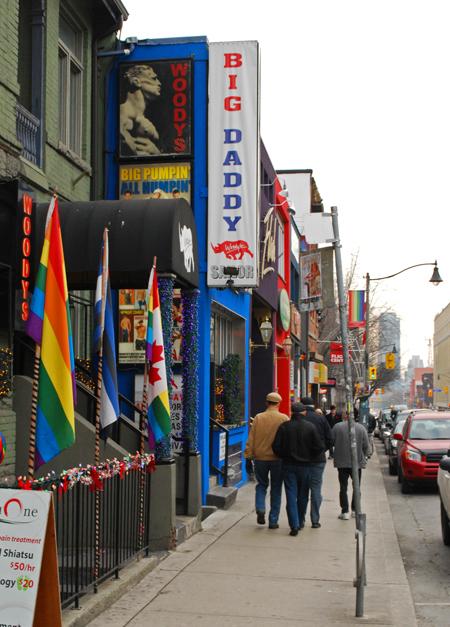Neighbourhood organizations are bracing for changes that are sweeping through the downtown core and threatening to alter completely the dynamic of the Church-Wellesley Village. Meetings of the Church-Wellesley BIA and the Church Wellesley Neighbourhood Association at the 519 Community Centre Dec 12 were focused on addressing these alarming trends.
With several condo tower projects proposed along the now mostly low-rise stretch of Yonge St between College and Charles streets, and more at the north and south ends of the village, some say it’s only a matter of time before the condo projects start appearing in the heart of the Church-Wellesley Village.
Seven new towers are proposed or under construction on that stretch of Yonge St, with four more recent high-profile land sales suggesting that even more towers could be proposed, says John Anderson, who owns the Morningstar furniture store. Lot sales that are fetching three to five times the assessed property value will spark massive reassessments and automatic property tax hikes in 2012, he predicts.
“All our taxes could go up 300 to 500 percent,” Anderson says. “None of us small business guys will still be here.”
Similar pressures could soon exist on Church St. A tower is proposed at the corner of Isabella St and many suspect it will be approved either by city council or by the Ontario Municipal Board.
However, another proposal that would have levelled several heritage properties between Gloucester and Dundonald streets was shot down by city staff and the developer has since put the properties back on the market.
The recent opening of Loblaws in the former Maple Leaf Gardens could have a more immediate impact on the nature of the Church-Wellesley Village. The huge retail location duplicates services that are provided by many other retailers on the strip, including an LCBO, pharmacy, groceries, high-end cheese shop and butcher, as well as a café and bakery. Its ready-made meals could also bite into restaurant sales.
Church St retailers are fighting back by attempting to offer better service and more opening hours.
But when the Ryerson athletic centre opens in the space above the store, it could become a source of significant additional pedestrian traffic through the Village, which could attract more destination shoppers.
James Robinson, executive director of the Downtown Yonge BIA, which includes Maple Leaf Gardens, suggests that Church St businesses do more to attract Ryerson students to their stores.
“They may need a bit of a welcome,” he says. “You could find ways to establish a straight-friendly environment.”
Village residents seem as concerned with the fate of the retail neighbourhoods along Church and Yonge as business owners are. They’re trying to slow down development in the neighbourhood by having those streets designated as heritage districts that would restrict development. They’re also working with the city on the North Downtown Yonge St Planning Framework, which will amend the city’s official plan to protect the neighbourhood from development.
Residents are concerned that the development could encroach on Norman Jewison Park and George Hislop Park, both of which are owned by the Toronto Parking Authority. City council has indicated that it is interested in selling TPA properties that could be developed into towers.
Residents are also worried about the possibility of a perfect storm of conditions favouring developers. If the city planners are locked out as part of contract negotiations in 2012, residents worry that developers will take their applications directly to the Ontario Municipal Board, where there would be no one to defend the city’s or residents’ interests. It is unclear at this point if the OMB would allow such an appeal to go forward during a labour action.
To that end, the CWNA is scrambling to get organized as quickly as possible to present a united and legally recognized voice in opposition to the scramble for Church St. It’s already legally incorporated and will be holding its first annual general meeting in January to elect a board.
Once in place, the CWNA board will attempt to draft a long-term vision for the neighbourhood that incorporates appropriate development and the characteristics of the retail environment and public realm that they want to protect and enhance.
The CWNA will also take positions on neighbourhood safety and beautification. Many present at the Dec 12 meeting expressed disappointment with the recent removal of benches from the corner of Church and Alexander over concerns of violence and drug dealing at that corner.
But one resident of the Alexus condo at that corner who refused to give his name to Xtra says that the corner has become much safer since the benches were removed.
“We want to see that corner remain vibrant, but we had no choice,” he says.
Some residents indicated that they wanted the CWNA to stand against city council’s plan to eliminate the Jarvis St bike lanes next year.


 Why you can trust Xtra
Why you can trust Xtra


